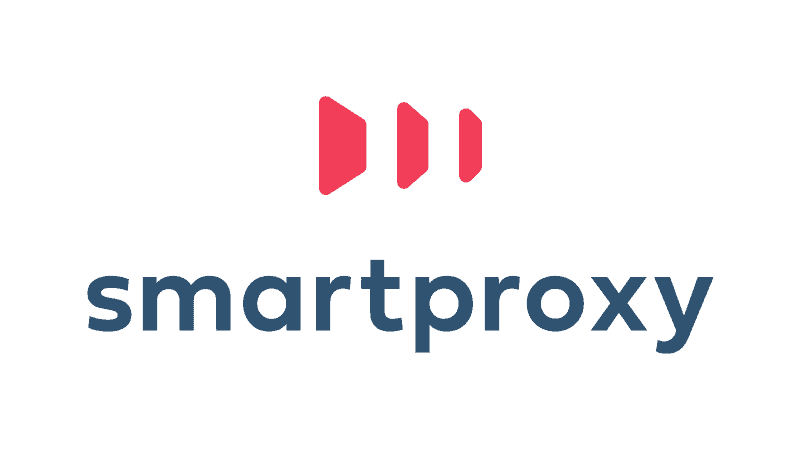Buy Best Datacenter Proxy Providers 2026
Datacenter proxies are IP addresses independent of residential internet providers. They are widely used by businesses for tasks like market analysis, web scraping, cybersecurity, and preventing phishing attacks, among many other applications.
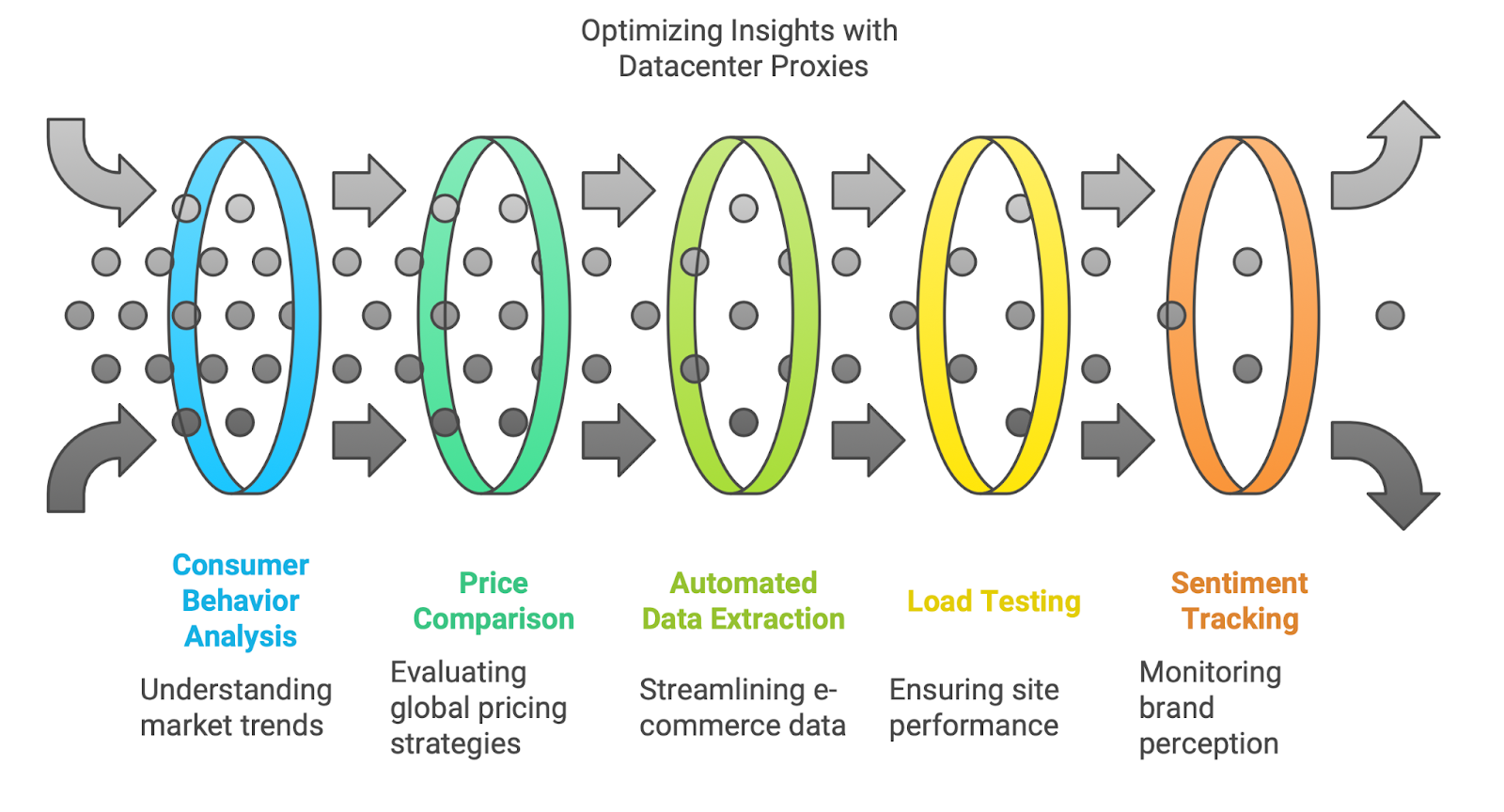
- Global ISP
- Dedicated Datacenter
-
+1 more
TypeGlobal ISP Dedicated Datacenter Rotating Residential
- Brazil
- Germany
-
+2 more
LocationsBrazil Germany France and others
- Shared Datacenter
- Dedicated Datacenter
-
+1 more
TypeShared Datacenter Dedicated Datacenter ISP Proxies
- 50+
- Datacenter Proxies
- Residential Proxies
-
+1 more
TypeDatacenter Proxies Residential Proxies Mobile Proxies
- 60+ locations
- 4,9 Users feedback
- 4,8 Experts evaluation
- 4,8 Proxybros rank
- SOCKS5
- HTTP
- HTTPS
- UDP
- Proxies in over 50 million locations, with precise targeting
- Both dedicated and shared servers on offer, including unlimited tiers
- Support for UDP alongside HTTP, HTTPS, and SOCKS5
- A user-friendly proxy dashboard
- Detailed manuals for proxy setup and integrations
- A referral program offered by the provider
- No free trial option before you buy
- Most of datacenter proxies are simple (HTTP)
+10% bonus on your first balance top-up Coupon code: PROXYBROS10
- Residential Proxies
- Mobile Proxies
-
+2 more
TypeResidential Proxies Mobile Proxies ISP Proxies Datacenter: IPv4 & IPv6
- Germany
- France
-
+18 more
LocationsGermany France Netherlands Spain Brazil India Turkey Canada Japan South Korea Sweden Poland Malaysia Indonesia Australia China Taiwan USA England and 210+ more
- 4,7 Users feedback
- 4,6 Experts evaluation
- 4,8 Proxybros rank
- SOCKS5
- HTTP
- HTTPS
- Proxy types for different use cases
- 99% uptime
- High connection speed
- Loyal customer support
- Mobile proxy setup and management
- Lack of free trial
- Anonymous
- Datacenter Proxies
-
+9 more
TypeAnonymous Datacenter Proxies Residential Proxies SOCKS5 Proxies Rotating ISP Proxies Search Engine Proxies Shared Proxies HTTP Proxy Sneaker Proxies Backconnect Proxies Dedicated Rotating Proxies
- Germany
- France
-
+20 more
LocationsGermany France Italy Netherlands Spain US Brazil India Mexico UK Canada Japan Belgium Czech Republic Lithuania Portugal Slovenia Ukraine Denmark Hungary Romania Greece
- 4,7 Users feedback
- 4,5 Experts evaluation
- 4,5 Proxybros rank
- SOCKS5
- HTTP
- HTTPS
- Various pricing options
- Unlimited threads
- Versatile scraping APIs
- 99.99% uptime
- 3-day money-back guarantee
- 24/7 support
- Overall expensive pricing
- Residential (mobile and Wi-Fi)
- Datacenter (in some countries)
-
+1 more
TypeResidential (mobile and Wi-Fi) Datacenter (in some countries) US ISP
- All
- 4,7 Users feedback
- 4,2 Experts evaluation
- 4,5 Proxybros rank
- SOCKS5
- HTTP
- UDP (for Residential)
- Huge IP pool across the globe
- Unlimited connections (ports)
- Email OTP authentication
- UDP protocol support
- Compatibility with multiple anti-detect browsers
- 24/7 human support
- Partnering with the WEDF to ensure full compliance with industry regulations.
- No app or browser extension
- No free trial, although 100 MB costs only $1.99 for 3 days
- Residential Proxies
- Mobile Proxies
-
+2 more
TypeResidential Proxies Mobile Proxies Rotating Residential Proxies Sticky Proxies
- Germany
- France
-
+12 more
LocationsGermany France Italy Netherlands Spain US India UK Canada Belgium Malaysia Indonesia Thailand Vietnam
- 4,9 Users feedback
- 4,6 Experts evaluation
- 4,7 Proxybros rank
- SOCKS5
- HTTP
- HTTPS
- A massive pool with 30+ million IPs
- No limits on IP rotation
- 4G/5G high-stealth mobile proxies
- HTTPS and SOCKS5 protocols supported
- 98.6% request success rate
- It is affordable and offers many flexible plans
- There are no separate services for gamers
- In the Micro plan, additional GBs are relatively expensive: $5/GB
- Static Residential Proxies
- Dedicated Datacenter Proxies
-
+3 more
TypeStatic Residential Proxies Dedicated Datacenter Proxies Rotating Residential Proxies Shared Datacenter Proxies Private Datacenter Proxies
- 5 countries – static residential proxies
- 40+ countries – datacenter proxies
-
+1 more
Locations5 countries – static residential proxies 40+ countries – datacenter proxies 195 countries – residential proxies
- 4,5 Users feedback
- 4,6 Experts evaluation
- 4,7 Proxybros rank
- SOCKS5
- HTTP
- HTTPS
- Vigorous speed tracking
- HTTP/SOCKS web proxy list for free
- 99.97% uptime
- Pass Auth and IP Auth available
- Very affordable prices
- Immediate proxy delivery
- Limited locations
- Limited request threads
- Datacenter Proxies
- Residential Proxies
-
+3 more
TypeDatacenter Proxies Residential Proxies Mobile Proxies ISP Proxies Enterprise Proxies
- Germany
- France
-
+43 more
LocationsGermany France Italy Netherlands Spain Albania Algeria Andorra US Brazil India Mexico Argrentina Turkey UK Canada Japan Belgium Czech Republic Lithuania Portugal Denmark Hungary Romania Greece South Korea Sweden Finland Switzerland Norway Poland Cyprus Malaysia Singapore Indonesia Australia China Egypt Philippines South Africa Thailand Vietnam Ireland New Zealand 195 countries worldwide
- 4,3 Users feedback
- 4,2 Experts evaluation
- 4,2 Proxybros rank
- SOCKS5
- HTTP
- HTTPS
- An extensive IP pool
- Premium quality – 99% average uptime and quick response time (~0.5-0.8s)
- Up to 7 days for sticky sessions
- Popular connection types covered (incl. HTTP, HTTPS, SOCKS5)
- Less time wasters on dead IPs with the checker and tester tools
- Lots of payment options supported
- Final proxy prices depend on add-ons and volume (most plans show “from” tags)
- Careful targeting and pacing are still needed for some high-risk tasks
- Datacenter Proxies
- Residential Proxies
-
+2 more
TypeDatacenter Proxies Residential Proxies HTTPS SOCKS5
- France
- India
-
+4 more
LocationsFrance India UK Canada USA and other 195 countries
- 4,5 Users feedback
- 4,7 Experts evaluation
- 4,7 Proxybros rank
- SOCKS5
- HTTP
- HTTPS
- 80M+ real-user IPsCountry, city, ISP, and ASN targeting
- Rotating, static, and ISP-style proxies are clearly split
- A proxy dashboard with useful traffic stats
- Support for anti-detect browsers and automation tools
- Good payment option variety (including crypto, Alipay, and local rails)
- No free access to test proxy performance
- Refund policy is strict
- Pricing in GB can be tricky to estimate
What Are Datacenter Proxies?
Essentially, they’re remote servers with unique IP addresses that reroute your web traffic and, thus, mask your actual geo-location and identity. These IPs are housed in data centers, which means they’re blazing fast and typically come with unlimited bandwidth.
However, they’re easier to flag compared to mobile or dedicated residential proxies. So, while you might hit some walls trying to access high-security sites like social media networks, Google, or certain retail platforms, datacenter proxies still excel in a ton of other scenarios where stealth isn’t the top priority.
Types of DC Proxy Servers
There are three main categories you’ll want to consider, each serving different needs:
- Shared Proxies
These are a solid upgrade from free proxies, delivering way better performance than public lists and giving you more bandwidth headroom than your typical freemium setups.
Yes, you’ll be splitting the IPs with other users, which isn’t perfect, but for smaller sites, you might not even notice. However, when it comes to tasks like search engine scraping, sneaker copping, or running multiple social accounts, these proxies fall short.
The upside? They’re way cheaper than private proxies. You can choose between a static IP list with unlimited bandwidth or a pool of rotating datacenter proxies that mimic residential ones.
- Dedicated Proxies
Also known as private proxies, they’re hosted on top-tier hardware and deliver peak performance since you don’t share them with anyone else. This exclusivity means less risk of getting blocked due to someone else’s usage.
Typically sold on a per-IP basis, they offer unlimited bandwidth but, as a rule, don’t rotate IPs—something to keep in mind.
- Rotating Datacenter Proxies
These proxy servers auto-switch IPs either after a set interval or after each user request, whether they’re shared or dedicated. Rotating IP addresses are a clutch for tasks that involve constant site access, like extensive web scraping or stress testing.
Difference Between Residential and Datacenter Proxies
Datacenter proxy server services: Speed demons, yet easy to spot
Datacenter proxies are fast, efficient, and built for speed. They’re hosted on physical servers in commercial data centers, not tied to any actual home internet service providers. What does that mean? Lightning-fast speeds, minimal latency, and unlimited bandwidth. If you’re looking to rip through web scraping tasks, do performance testing, or automate bulk actions on websites, datacenter proxies are your go-to.
However, these proxy server services aren’t exactly subtle. They’re easier to detect since websites can sniff out their non-residential origins. Some platforms are pretty quick to put these IP addresses on the naughty list. So, if you know you gonna sneaking around with aggressive firewalls or struggling to avoid bans, datacenter proxies might not always be your best bet.
Residential proxies: The masters of secrecy
These proxies are legit IP addresses assigned by Internet Service Providers to real devices like your neighbor’s Wi-Fi or that cafe’s hotspot down the street. Because they blend in like actual users, websites treat them as legitimate traffic. And all that is great for avoiding blocks, accessing geo-restricted content, or getting around CAPTCHAs like a pro.
But all this authenticity comes at a cost. Residential proxies are generally slower and come with bandwidth limits, so they aren’t exactly built for speed demons. Nevertheless, scraping sensitive sites, monitoring social media ads, and doing deep-dive competitor research is your use case here.
TL;DR
Datacenter proxies are fast, cheap, and scalable – great for quick, high-volume tasks but easy to detect.
Residential proxies are slower yet stealthy, hard to block, and perfect for when you need to stay anonymous or access restricted content.
In the end, it’s all about your use case. If speed and scale are your priorities, datacenter proxy server services are your jam. If secrecy and legitimacy are what you’re after, then residential proxies are worth every extra cent. Choose your fighter wisely!
Datacenter Proxy Provider – TOP Reviews
1. Toolip – Best Datacenter Proxies for E-Commerce Price Monitoring
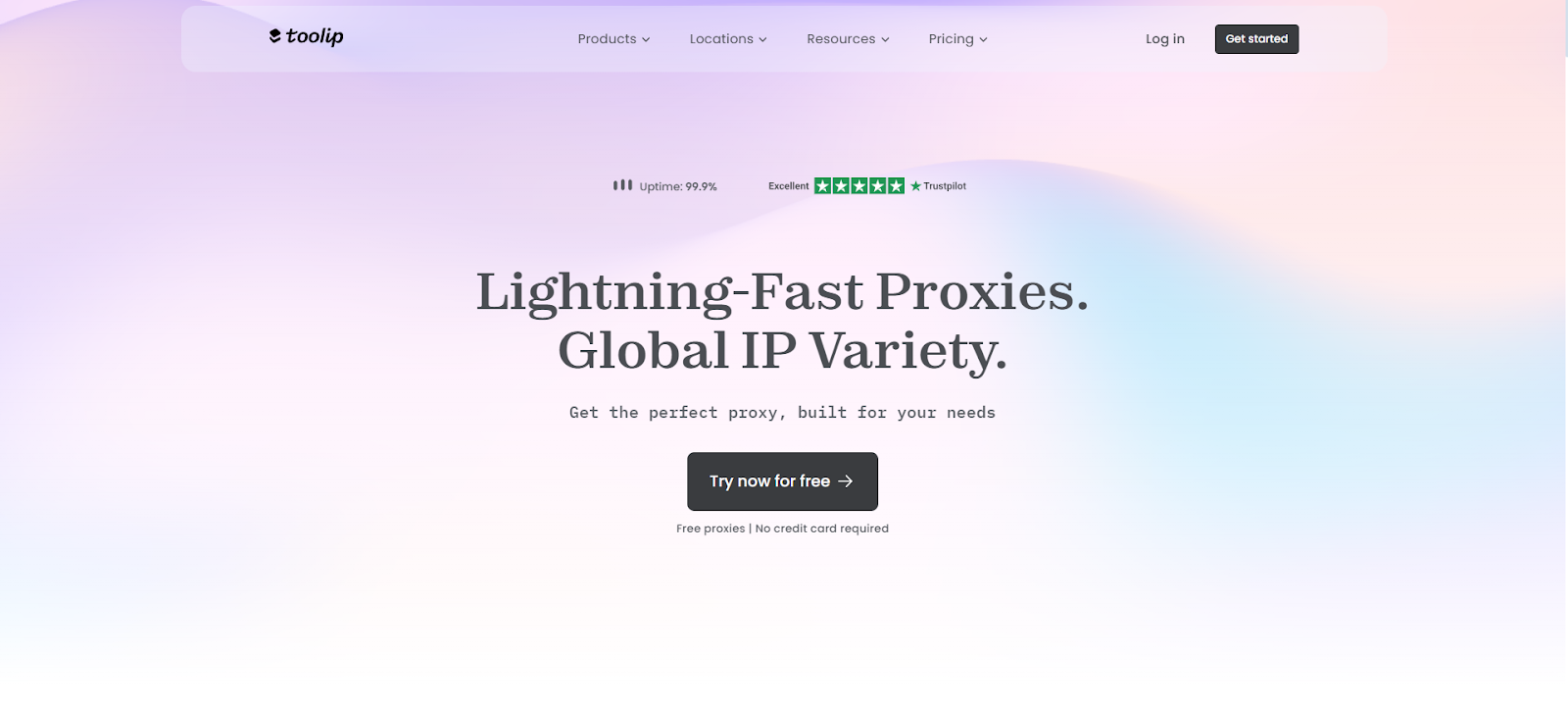
Overview
| Why Best for Price Monitoring | Use Cases |
|
✔️ Fast datacenter IPs for real-time price tracking ✔️ Unlimited concurrent connections for large-scale monitoring ✔️ Flexible session control for stable data collection |
Monitoring product prices on Amazon, eBay, or Walmart Comparing prices across different regions for market insights Automating price alerts for competitive analysis |
Toolip Proxy’s datacenter proxies are a must-have for e-commerce price monitoring, delivering fast and reliable connections for real-time tracking. I used them to monitor product prices on Amazon and eBay, and the stable connections let me collect data without any interruptions—key for catching price changes as they happen.
With unlimited concurrent connections, I could monitor multiple platforms like Amazon and eBay at once. I easily compared laptop prices in cities like New York and London thanks to their city-level targeting, and the option to switch IPs per request or keep one for 30 minutes ensured consistent data scraping
Performance Testing
Toolip Proxy showed consistent performance during my tests:
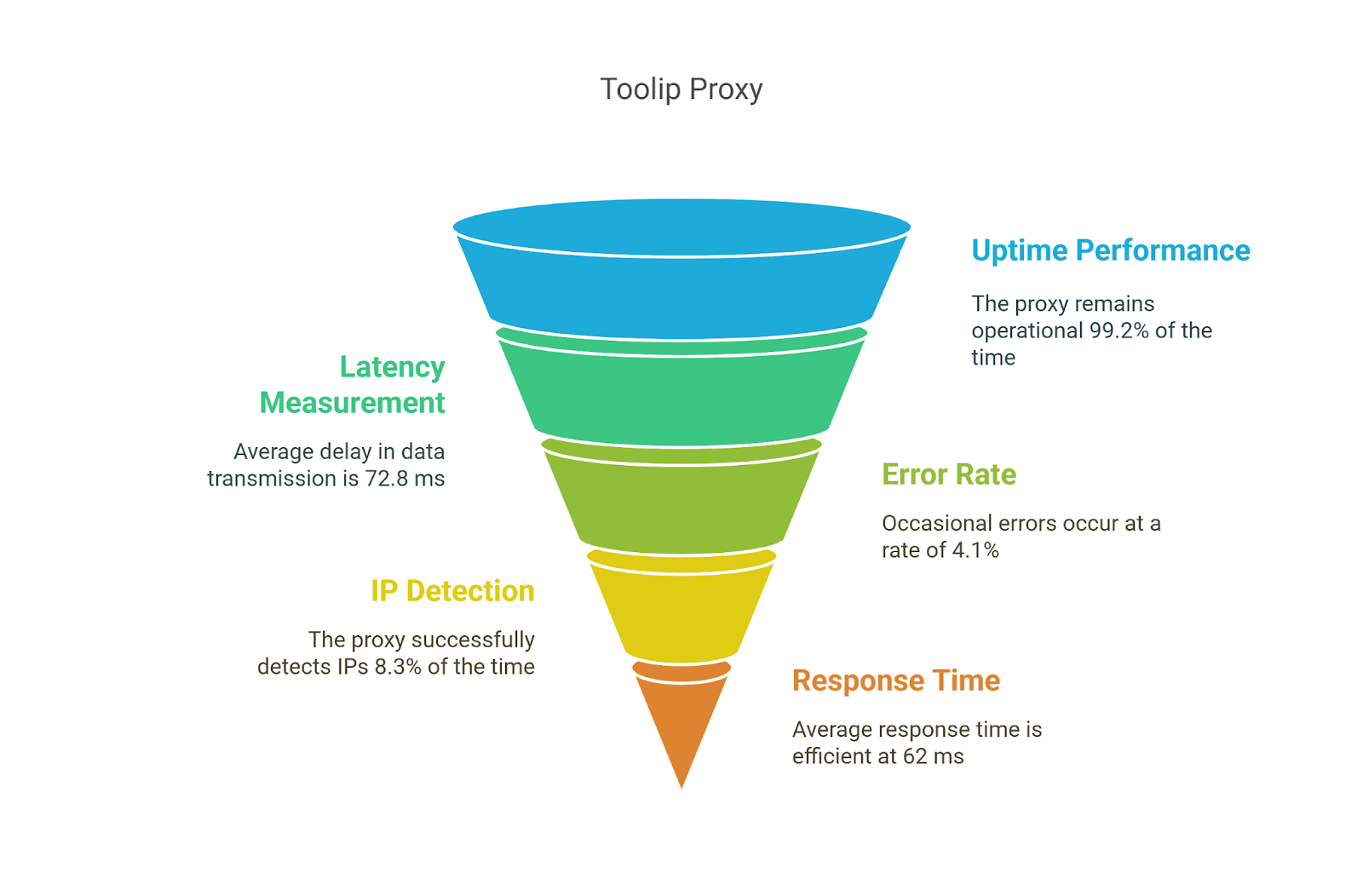
Pricing
- Free trial: 5 free proxies to test the service.
- Online payment methods: PayPal, Visa, MasterCard, Google Pay.
| Proxy Type | Plan | Bandwidth | Price per IP/GB | Total Cost (Monthly) |
| Shared Datacenter Proxies | 3-day (Free) | Up to 100MB | $0 / IP | $0 |
| 100 proxies | Up to 2000GB | $0.29 / IP | $28.99 | |
| Dedicated Datacenter Proxies | 5 proxies | Up to 100GB | $2.00 / IP | $9.99 |
| 100 proxies | Up to 2000GB | $1.28 / IP | $127.99 |
2. Oculus – Best Datacenter Proxy for Scalable Bot Operations
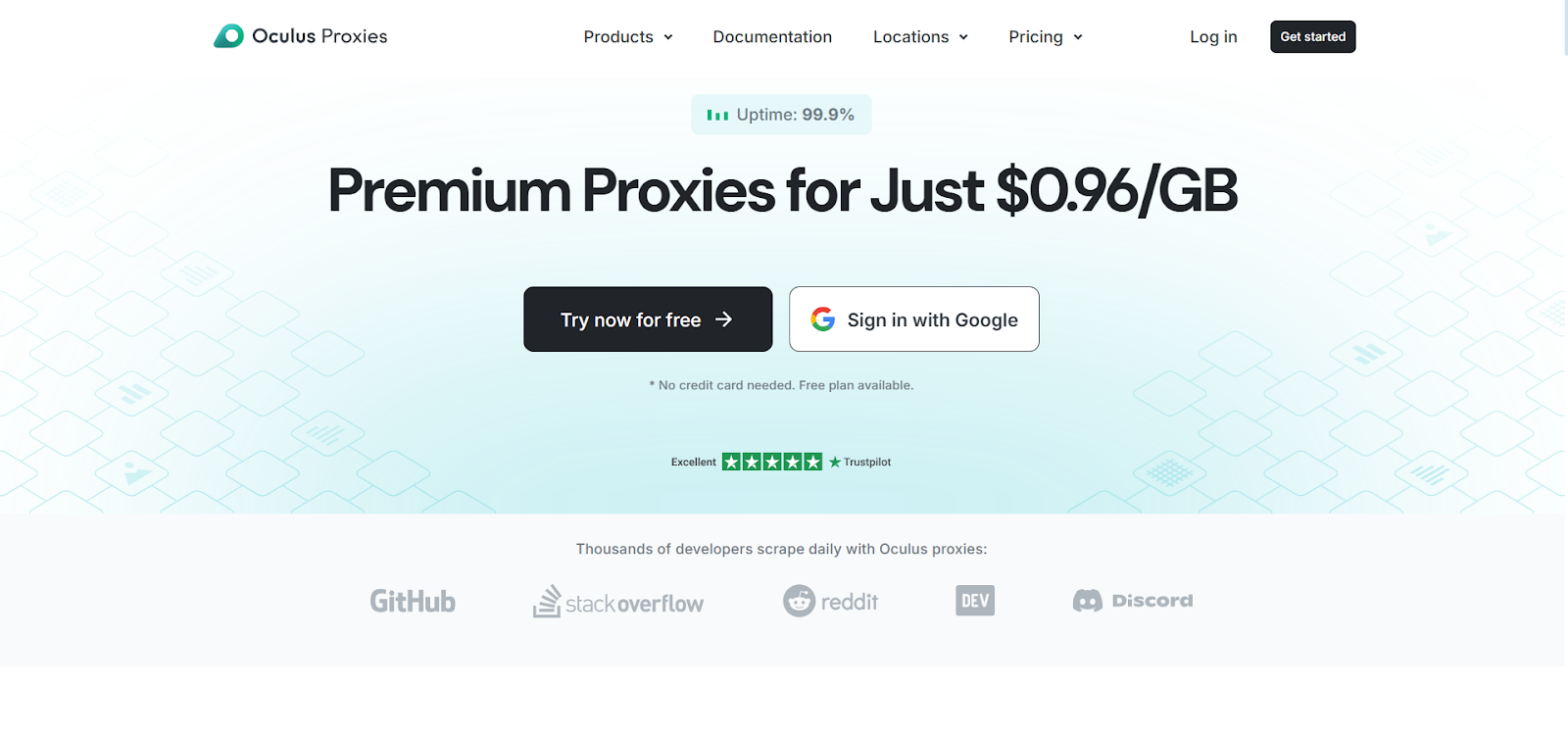
Overview
| Why Best for Price Monitoring | Use Cases |
|
✔️ Low-latency datacenter IPs for efficient bot performance ✔️ Unlimited concurrent connections for large-scale operations ✔️ Stable connections for continuous bot activity |
Running multiple bots for data collection or automation Managing bot-driven tasks like scraping or monitoring Automating workflows without risking downtime |
Oculus Proxy’s datacenter proxies are perfect for scaling bot operations, delivering high-speed and reliable connections. I ran multiple bots for data collection, and the low-latency connections ensured they operated smoothly without interruptions. With unlimited concurrent connections, I scaled my bot operations effortlessly. The static IPs provided consistent performance, and sticky sessions up to 10 minutes ensured stable connections during long bot runs—no interruptions, even with 24/7 activity.
Performance Testing
Oculus Proxy performed impressively in my tests:
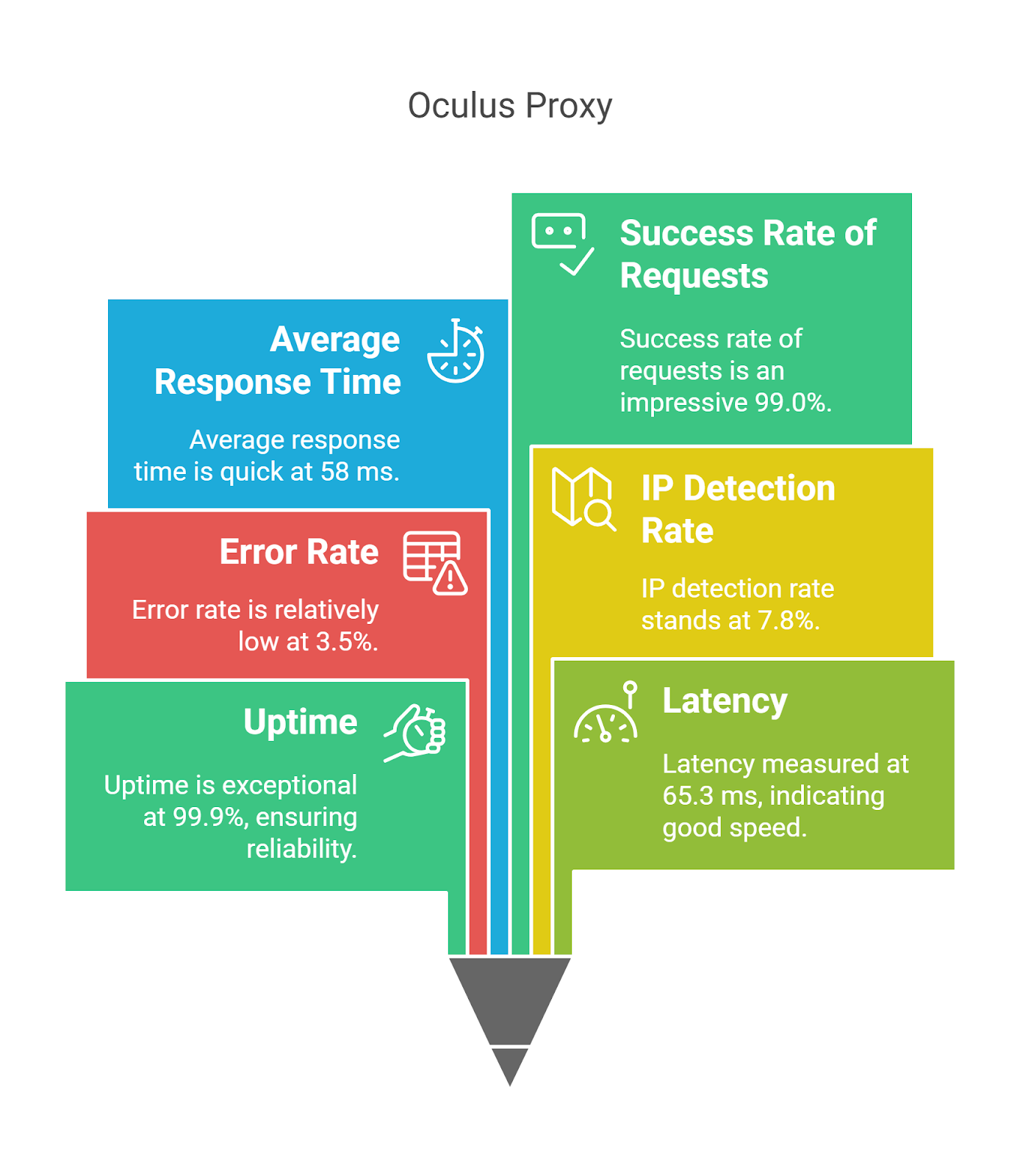
Pricing
- Free trial: 5 datacenter IPs + 100MB residential data for 7 days.
- Online payment methods: Visa, MasterCard, Amex, PayPal.
| Proxy Type | Plan | Price per GB/IP | Total Cost (Monthly) |
| Shared Datacenter | 100 MB (Free) | $0 / GB | $0 (7 days) |
| 200 GB | $0.13 / GB | $25.00 | |
| Dedicated Datacenter | 25 IPs | $0.60 / IP | $15 |
| 200 IPs | $0.50 / IP | $100 |
3. CyberYozh – Best Budget Static Datacenter IPv4 for Geo QA

Overview
| Why Best Budget Static Datacenter IPv4 for Geo QA | Use Cases |
| ✔️ Affordable per-country static IPv4 addresses | ✅ Checking how a site behaves from specific countries (pricing, content, redirects) |
| ✔️ Unlimited traffic on datacenter plans | ✅ Light-to-medium scraping where speed is priority |
| ✔️ Easy to buy and plug into your tools | ✅ QA for regional checkout flows, CDN variations, and uptime checks |
With CyberYozh’s datacenter line, you’re basically renting specific server-side IPs you can keep stable for a month. That stability is the whole point: one IP stays the same, so sessions don’t get weird mid-run. I also like that the whole process is self-service – no need to talk to sales first. You pick a country, pay, and get a set of dedicated IPv4/IPv6 options (plus a cheaper shared DC tier).
I ran these proxies in two setups. First: a Python requests script for price checks and stock snapshots on a couple of ecom pages. Second: Playwright for a few location-sensitive pages where I needed a real browser session to render and grab final HTML. The proxies behaved like proper datacenter pipes – fast and predictable. Should a target block the IP, you know it’s the IP, not some rotating gateway doing its own thing.
And if you’re after integrations, there’s a partner hub that covers anti-detect browsers (GoLogin, Dolphin Anty, AdsPower, Octo, etc.), as well as white-page and cloaking services. Integration with this kind of tooling shows that CyberYozh suits automation stacks well.
Performance Testing
I ran a quick HTTP run (multi-geo: US/DE/SG) against a mix of HTML pages + a lightweight JSON endpoint to see how stable the pipes are.
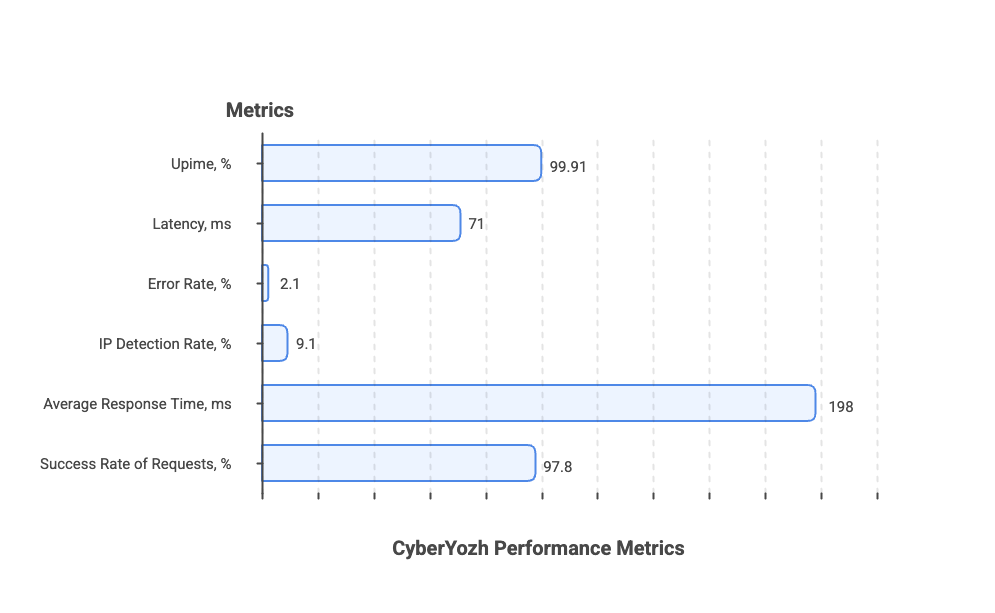
Pricing
- Free trial: no demo access (test with the cheapest plan).
- Payments: top-ups via cards and crypto.
| Proxy Type | Model | Typical Prices |
| Datacenter (Dedicated) | Static IPv4, unlimited traffic | $1.87–$2.43 / month per IP |
| Datacenter (Shared) | Static IPv4, shared, capped traffic | $1.53–$1.97 / month per IP |
| Residential (ISP / Static) | Static residential IPv4 | from $5.29 / month |
| Residential (Rotating) | Traffic-based | ~$2.70/GB to ~$1.75/GB |
| Mobile (Dedicated) | LTE/5G, unlimited traffic | $8.00 / day |
| Mobile (Shared) | LTE/5G, unlimited traffic | $3.00 / day |
4. Proxy-Seller — Choose it for Load Testing & Site Performance Monitoring
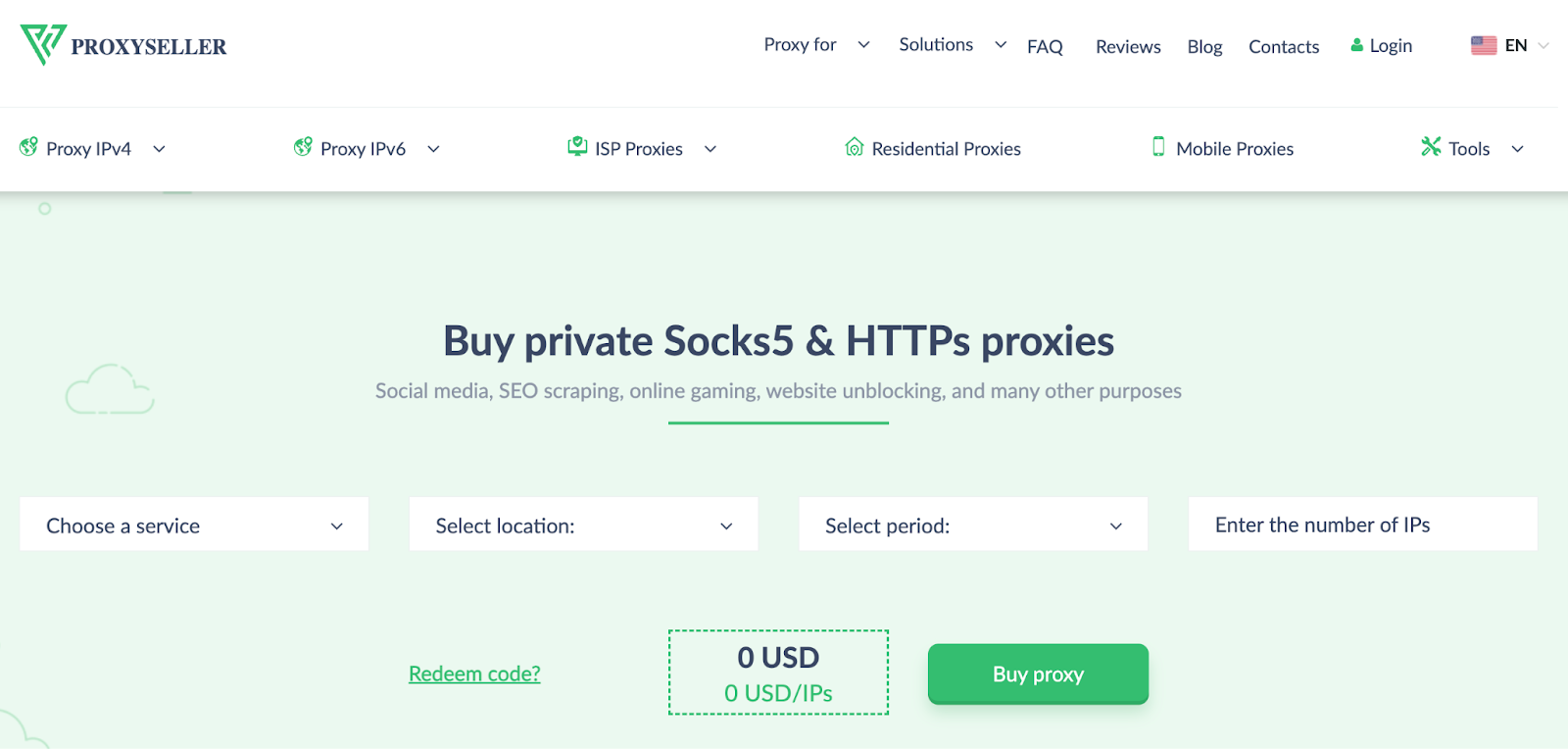
Overview
| Why Best for Load Testing & Site Performance Monitoring | Use Cases |
|
✔️ High traffic volume ✔️ Geographic diversity ✔️ Simultaneous connections |
✅Simulating high traffic for website scalability testing ✅Monitoring web application response times across different regions ✅Monitoring third-party API performance and availability ✅Endurance testing for long-term site stability ✅Load testing e-commerce platforms to prevent checkout failures |
Proxy-Seller deals strictly in dedicated datacenter proxies, providing them up in straightforward static IP lists.
Their reach is pretty impressive for this type of proxy, with datacenter IPs available on five continents, though their main focus is on Europe. I like that here you can go for sourcing IP addresses from a specific geo-location or a mix. As for the latter, I, in particular, tested the package Worldwide Mix 1, which includes 25% US IPs and the rest distributed globally.
You also won’t hit any caps on traffic or concurrent threads. However, Proxy-Seller does recommend sticking to a modest three threads per IP for optimal performance. If you like a bit of flexibility, though, you can refresh some or all of your datacenter IPs on a monthly basis, plus there’s support for multiple connection protocols.
One notable downside? No built-in IP rotation, so if your game plan involves heavy-duty scraping, this might not be the best fit.
Performance Testing
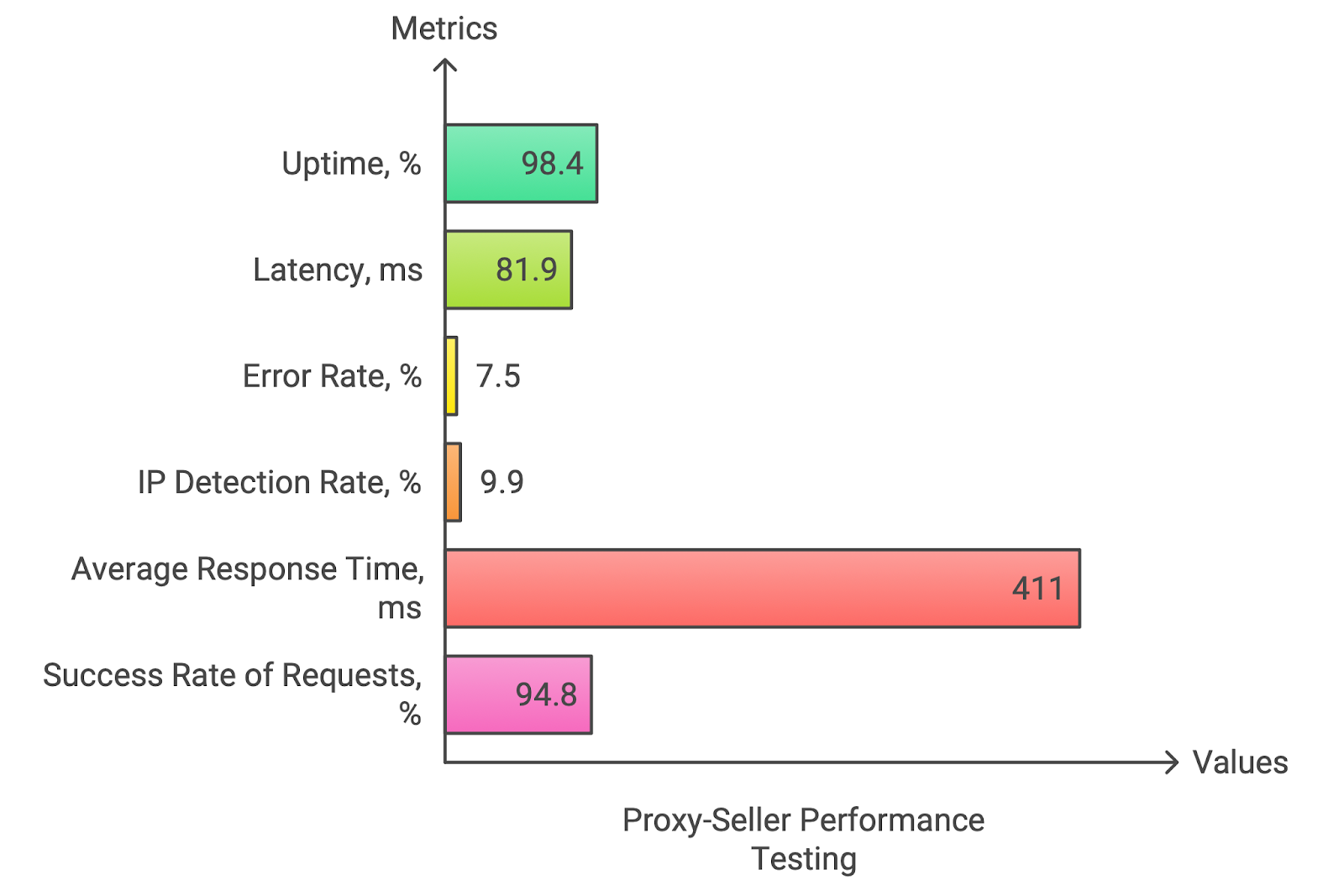
Pricing
- Free trial – 24 hours;
- Buy dedicated proxies via Payoneer, PayPal, credit cards, or cryptocurrencies.
| Plan | Rental Period | Discount | Price | Buy |
| 5 IPs | 1 month | 20% | $9 | Buy |
| 10 IPs | 1 month | 20% | $18 | Buy |
| 25 IPs | 1 month | 20% | $45 | Buy |
| 50 IPs | 1 month | 30% | $79 | Buy |
| 100 IPs | 1 month | 30% | $158 | Buy |
5. Smartproxy — Best for Consumer Behavior & Competitive Market Analysis
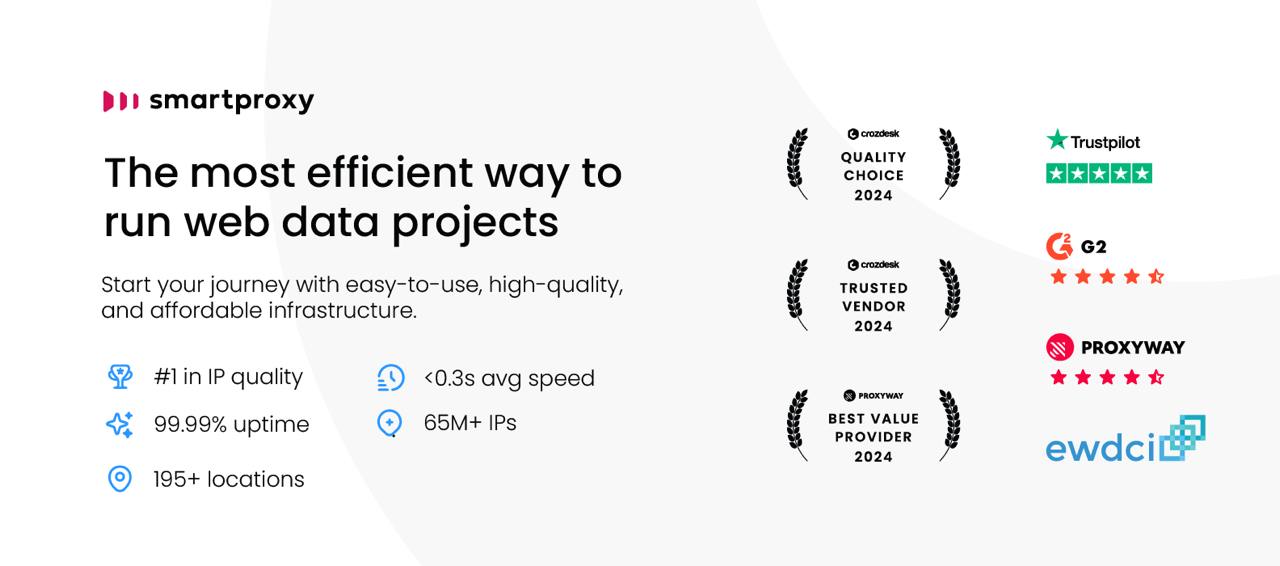
Overview
| Why Best for Market Research | Use Cases |
|
✔️ Customizable IP pools ✔️ Session persistence (sticky IPs for up to 30 min) ✔️ Still high anonymity |
✅Competitive market analysis ✅Industry trend monitoring ✅Sentiment analysis across online platforms ✅Geographic and demographic data collection ✅Consumer behavior analysis |
They’ve got a hefty pool of 100,000 traffic-based shared proxies across the US and Europe, plus IP-based datacenter proxy server services spanning eight locations across four continents. No matter which plan you roll with, you’ll get full access to the entire pool. Moreover, you get zero target restrictions and unlimited parallel connections. With auto-rotation on every connection request, this best datacenter proxy provider is a dream for market research. If you need stability, you can opt for 30-minute sticky sessions.
If, on the other hand, you’re looking for exclusive access, Smartproxy’s dedicated IPs (400K) in the US come with unlimited bandwidth and access to all domains without hidden costs.
I must say their dashboard is a playground for customization. You may choose between sequential or non-sequential proxies and pick your protocol: SOCKS5 or HTTP(S). Plus, you have the flexibility to refresh your entire IP list upon subscription renewal or stick with your existing set.
Performance Testing
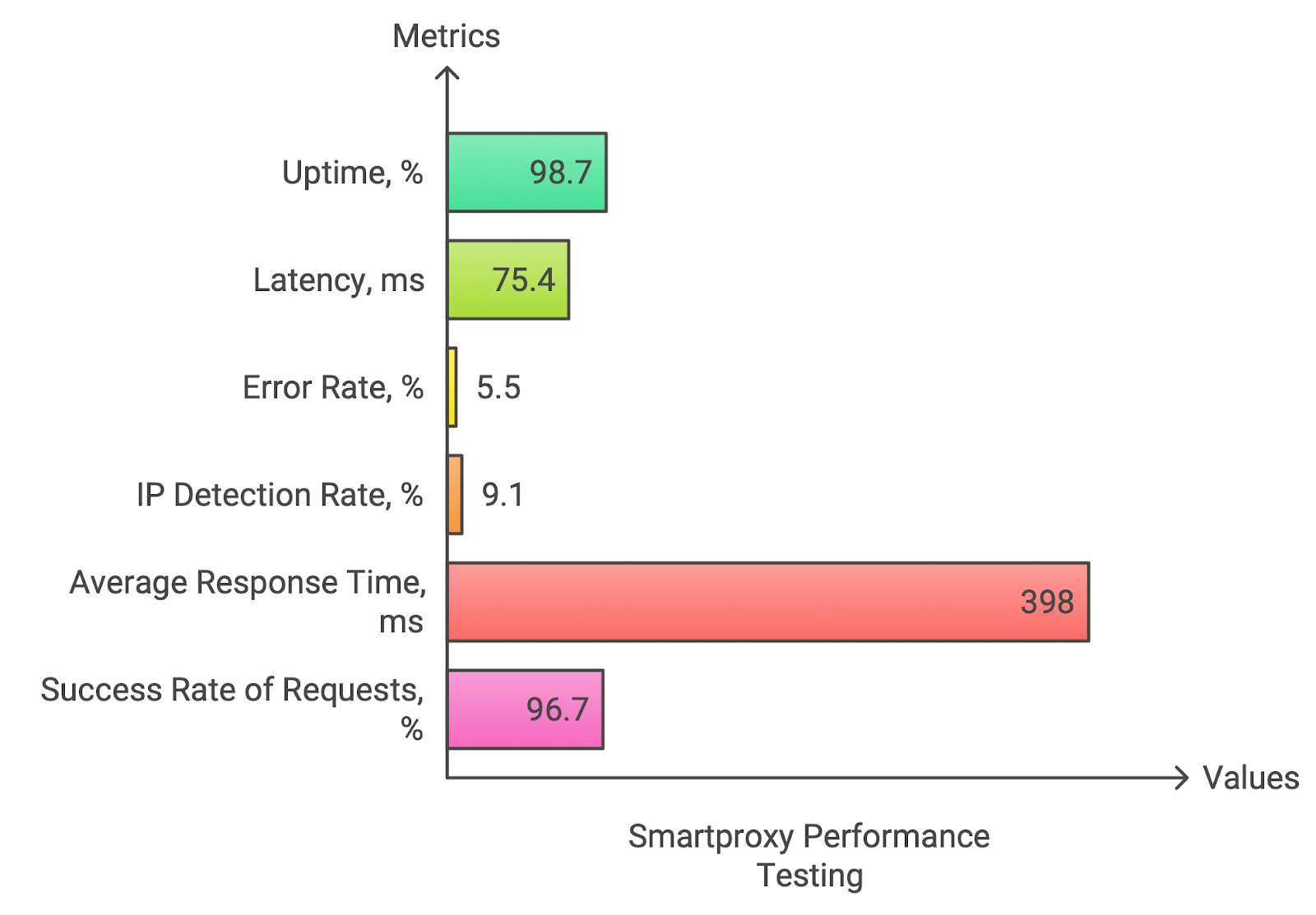
Suits ideal for market research
Pricing
- Free trial – 100 MB;
- Online payment methods: Credit cards, ApplePay, GooglePay, PayPal, or cryptocurrencies.
| DEDICATED | ||||
| Plan | Price per IP/GB | Discount | Price per month | Get |
| 3 IPs | $2.5 | – | $7.5 | Buy |
| 20 IPs | $2 | 20% | $40 | Buy |
| 50 IPs | $1.9 | 24% | $95 | Buy |
| 200 IPs | $1.6 | 36% | $320 | Buy |
| SHARED (PER IP) | ||||
| 100 | $0.1 | – | $10 | Buy |
| 200 | $0.095 | 5% | $19 | Buy |
| 500 | $0.09 | 10% | $45 | Buy |
| SHARED (PER GB) | ||||
| 50 | $0.6 | – | $30 | Buy |
| 100 | $0.55 | 8% | $55 | Buy |
| 300 | $0.53 | 11% | $160 | Buy |
| 1,000 | $0.5 | 17% | $500 | Buy |
6. Soax — Use it for Global Price Comparison Across Multiple Regions & Currencies
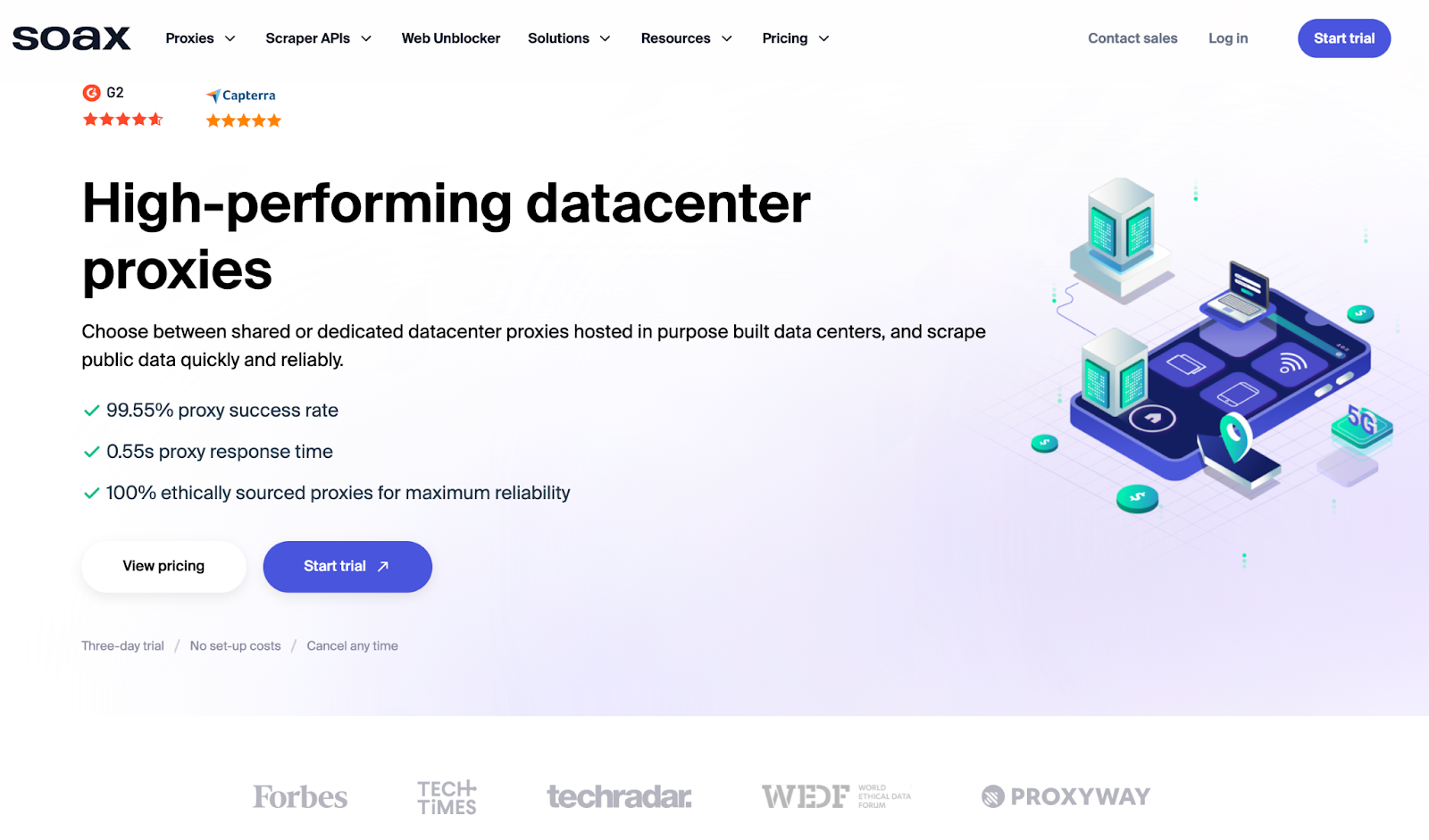
Overview
| Why Best for Price Aggregation | Use Cases |
|
✔️ High throughput (can handle high volumes of requests simultaneously for fetching price data from many sources) ✔️ Scalability (required to accommodate large-scale aggregation tasks) ✔️ Low latency |
✅Real-time price monitoring across multiple retailers ✅Market intelligence for price sensitivity and demand forecasting ✅Dynamic pricing strategies for e-commerce platforms ✅Tracking flash sales and discount offers across websites ✅Global price comparison across multiple regions and currencies |
This datacenter proxy provider offers dedicated/shared proxies hosted in purpose-built facilities to efficiently scrape public data at lightning speeds. Its datacenter proxy server services deliver outstanding speed and reliability since they operate within specialized data centers designed to manage massive internet traffic. Equipped with high-speed connections and powerful hardware, these datacenter proxies ensure consistent, high-performance output.
Currently, Soax operates its datacenter proxy servers in six locations across Europe and North America, including the US, Germany, the UK, France, and Poland. Switching between thousands of IPs should be easy thanks to user-friendly proxy extensions and apps—no convoluted configurations required.
I also guess that effortless integration with users’ existing tech stack was their top priority. Cause with just a few API calls, you can incorporate its datacenter proxies into Python scraper bots or redirect web traffic for A/B testing. You can also fine-tune your targeting by selecting IP addresses based on country or even city to access geo-restricted content without any effort.
Soax integration guides cover all the popular programming languages and frameworks like Python, NodeJS, and Selenium. Plus, its support team is always ready to assist if you need help getting set up.
The proxy network of this provider can easily manage unlimited concurrent connections and bandwidth-heavy activities. And lastly, to keep your datacenter proxies from getting flagged, Soax implements advanced tactics like ASN rotation, strategic IP cycling, and intelligent caching to dodge bot detection systems.
Performance Testing
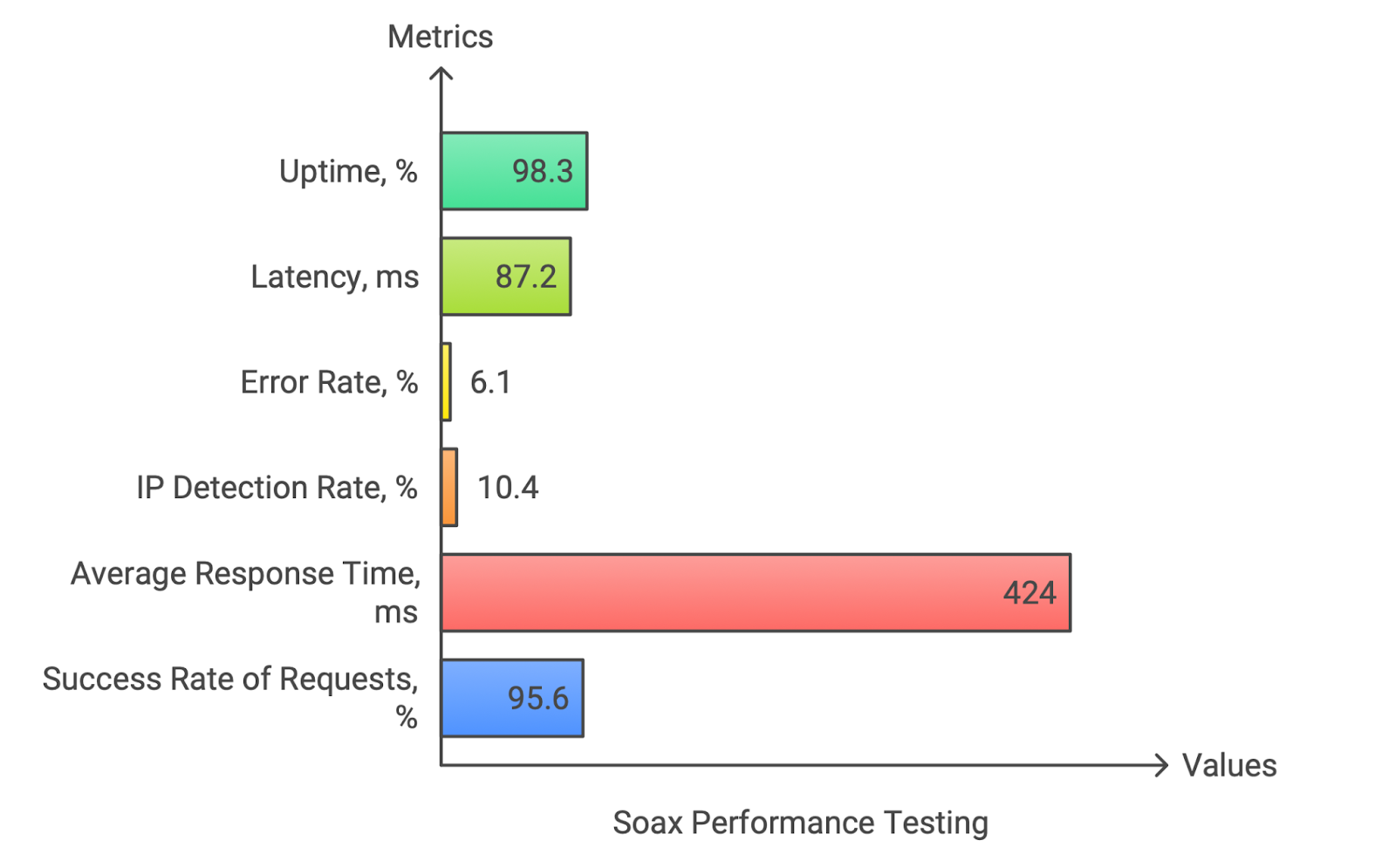
Pricing
- Free trial – 100MB for 3 days per $1.99;
- Buy dedicated proxies via bank transfer, credit card, or cryptocurrency.
| DEDICATED (PER IP) | ||||
| Plan | Traffic | Price per IP/GB | Price per month | Buy |
| DC Dedicated 5 | 5 IPs | $2.5 | $12.5 | Buy |
| DC Dedicated 100 | 100 IPs | $2 | $199 | Buy |
| DC Dedicated 1,000 | 1,000 IPs | $1.50 | $1,499 | Buy |
| DC Dedicated 5,000 | 5,000 IPs | $1.20 | $5,999 | Buy |
| SHARED (PER GB) | ||||
| DC Shared 75 | 75GB | $0.65 | $49 | Buy |
| DC Shared 500 | 500GB | $0.60 | $299 | Buy |
| DC Shared 2,000 | 2,000GB | $0.50 | $999 | Buy |
7. AnyIP — Best Private Rotating Proxies for Large-Scale Web Scraping
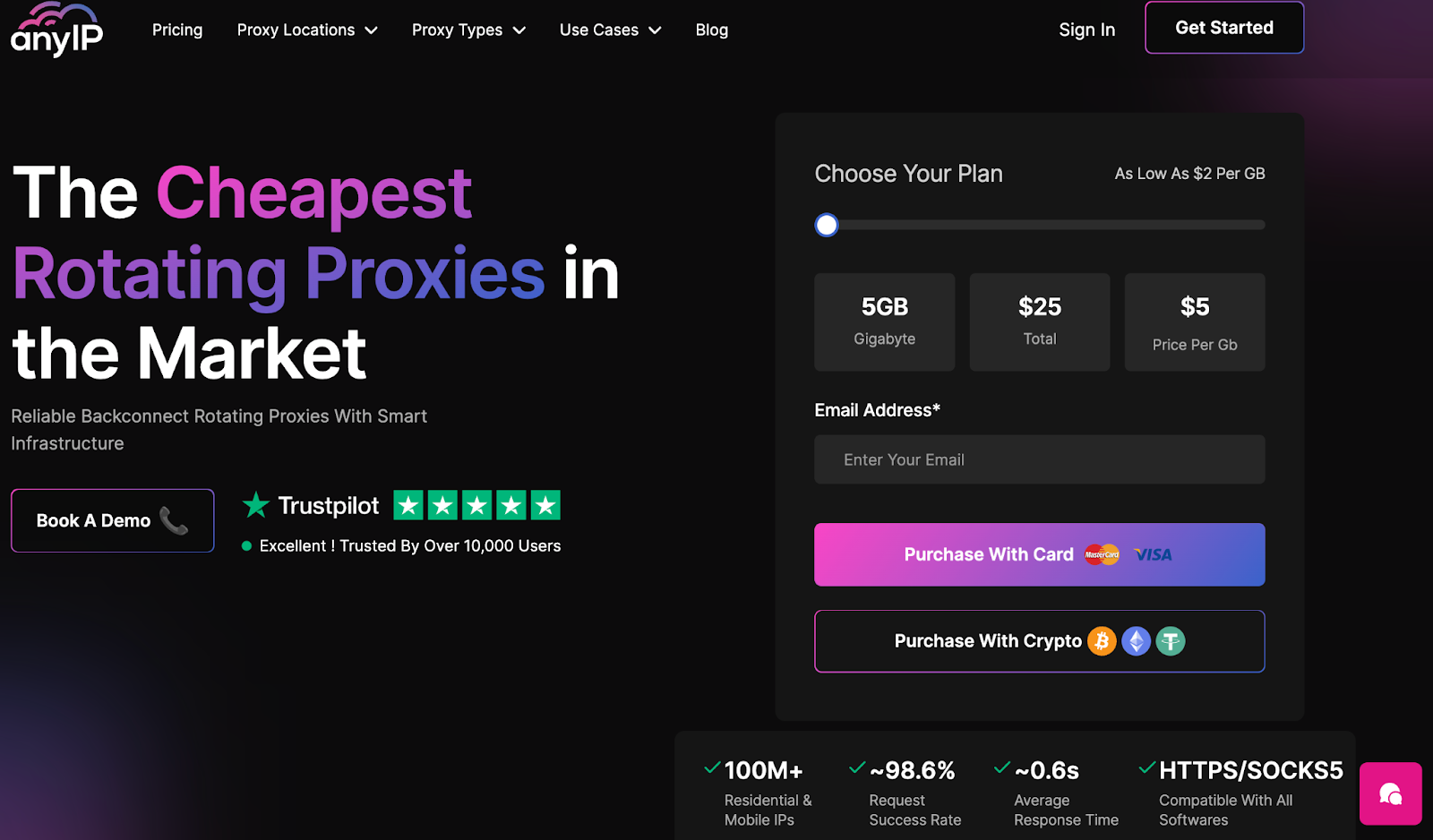
Overview
| Why Best for Web Scraping | Use Cases |
|
✔️ High speed (required for fast data retrieval to scrape large volumes of information quickly) ✔️ Unlimited bandwidth ✔️ Large IP pool (needed to avoid getting blocked and to rotate frequently) |
✅Automated data extraction from e-commerce websites for competitive intelligence ✅Content aggregation for news websites and content platforms ✅Gathering public data for market research and trend analysis ✅Scraping real-time financial data for stock market analysis and forecasting ✅Extracting job listings and salaries for recruitment analytics |
The relative freshness of this proxy service means it’s not weighed down by bulky legacy systems like some other best datacenter proxy providers. This lean setup lets AnyIP keep proxy costs super low, passing those savings directly to its loyal users.
They’re laser-focused on delivering what they excel at – globally rotating American, European, and Asian proxies across their networks. Its rotating datacenter proxies are versatile, and personally, I employ them for anonymous browsing, full-scale web scraping, and SEO tracking.
When you log in using AnyIP rotating proxies, each website request connects to a fresh IP address. This dynamic IP shifting makes it virtually impossible for websites to pinpoint or track your access location.
Moreover, the rotating solutions of this proxy service are fortified against subnet bans and CAPTCHAs. Plus, you can toggle between sticky sessions and fully rotating IPs, so you get both static-like consistency and the flexibility to switch up for anonymous activities.
Another perk I’d like to highlight is AnyIP’s customization—you can easily set up sub-users, manage access with IP whitelists or passwords, and allocate bandwidth quotas per proxy to keep every project in check.
Performance Testing
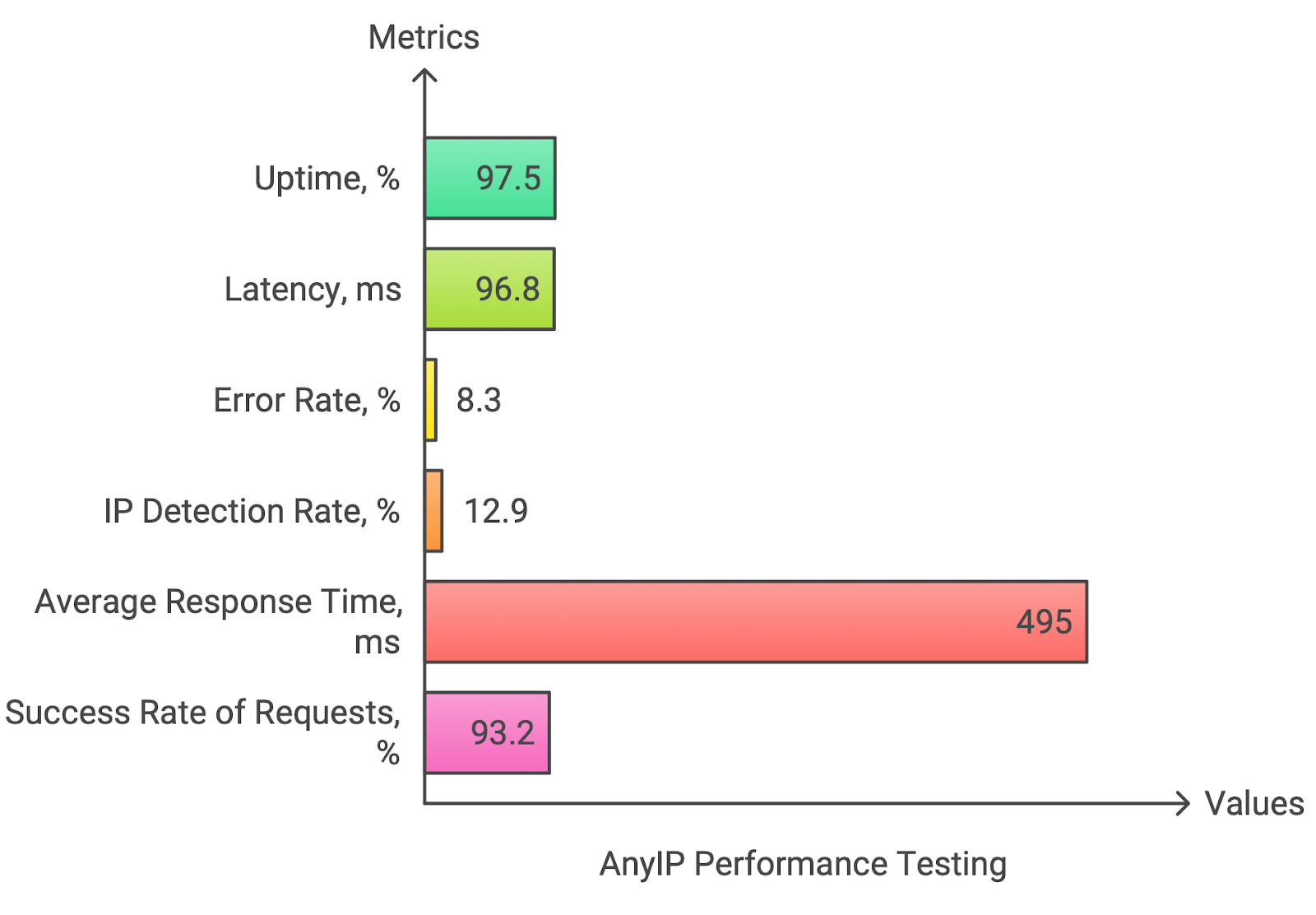
Pricing
- Free trial – no;
- Online payment methods: Credit cards, cryptocurrencies, or wire transfers (for Pro and Enterprise plans only.)
| Plan | Team members | Traffic | Price per GB | Price per month | Buy |
| Micro | 2 | 5 GB | $5 | $25 | Buy |
| Basic | 5 | 20 GB | $4 | $80 | Buy |
| Pro | 10 | 100 GB | $3 | $300 | Buy |
| Enterprise | Unlimited | 500 GB | $2 | $1,000 | Buy |
8. Webshare — Best Semi-Dedicated Proxies for Brand Protection
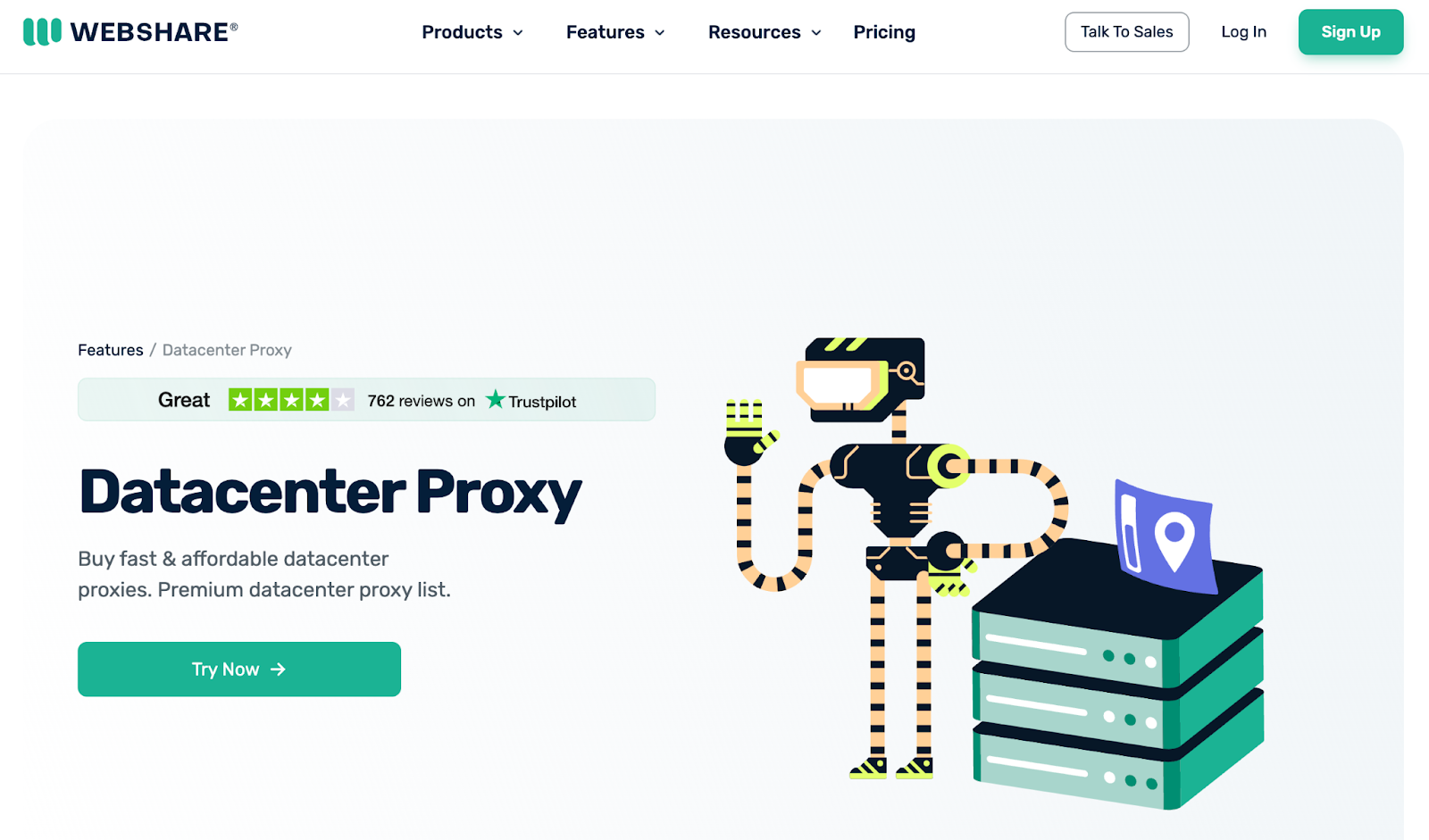
Overview
| Why Best for Brand Protection | Use Cases |
|
✔️ Diversity of geo-specific IPs ✔️ Flexible IP rotation ✔️ High availability / continuous access |
✅Monitoring online marketplaces for counterfeit products and unauthorized sellers ✅Protecting digital assets from scrapers and content theft ✅Tracking brand mentions and customer sentiment across social media and forums ✅Enforcing licensing agreements and protecting against gray market sales ✅Detecting and preventing brand abuse in affiliate and partner networks |
Webshare offers a flexible lineup of datacenter proxies, with server services like shared (multiple users), semi-dedicated (0-2 users), and dedicated proxies. They support both HTTP and SOCKS5 protocols and cover 50+ locations globally. While the proxies are static by default, there’s also an option to rotate IP addresses with every new connection.
I love that its self-service is highly customizable! I mean, you get to handpick the number of proxies, set your bandwidth cap, adjust the thread count, and even choose the IP geo-location that best fits your needs. Plus, you can opt for IP refresh intervals ranging from every 5 minutes to a month, giving you control over how dynamic your setup is. And don’t worry about getting lost in the sauce—their dashboard is super intuitive, even for first-timers.
Webshare doesn’t leave newbies hanging. They offer a free plan that includes 10 static IP addresses spread across 4 regions. With 1 GB of free monthly data and support for up to 50 threads, you get a solid starter pack to test the waters. Just register, and you’ll automatically get your free proxy list.
The service primarily targets entry-level and mid-tier users, keeping prices easy on the wallet. However, be prepared for a bit of patience if you need help—they don’t offer live chat support; instead, you’ll have to reach out via email.
And BTW its top-tier security measures encompass DNS leak prevention, TCP fingerprint masking, and open port detection.
Performance Testing
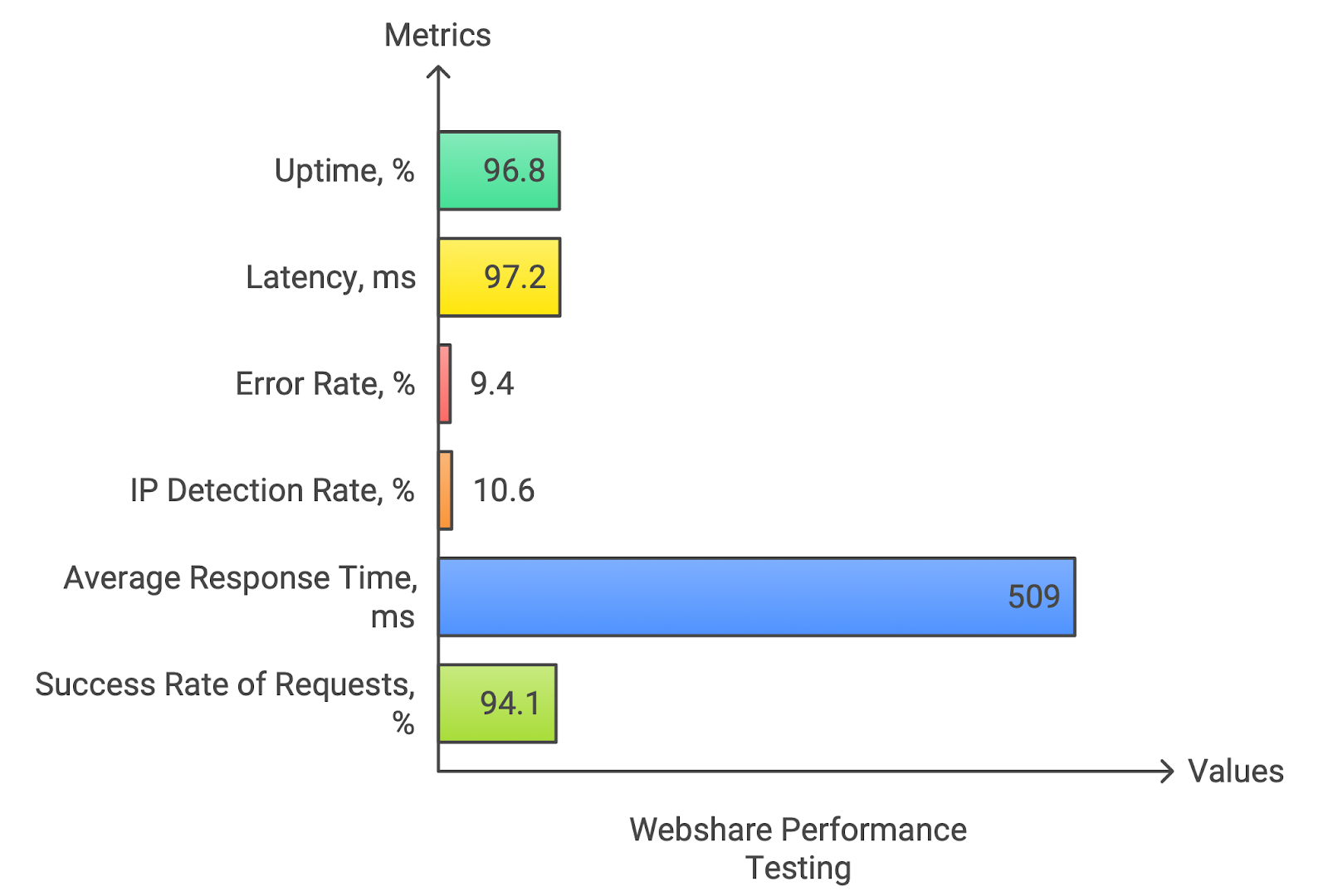
Pricing
- Free trial – 10 free datacenter IP addresses with a 1GB bandwidth per month.
- Online payment methods: Credit cards, Apple Pay, American Express, UnionPay, and Google Pay.
| Plan | Bandwidth | Price per month | Buy |
| 10 | 1GB | FREE | Buy |
| 100 | Up to 5,000GB | $2.99 | Buy |
| 250 | Up to 5,000GB | $7.47 | Buy |
| 500 | Up to 5,000GB | $14.20 | Buy |
| 1,000 | Up to Unlimited | $26.91 | Buy |
| 2,500 | Up to Unlimited | $63.54 | Buy |
| 5,000 | Up to Unlimited | $119.60 | Buy |
| 10,000 | Up to Unlimited | $224.25 | Buy |
| 15,000 | Up to Unlimited | $313.95 | Buy |
| 25,000 | Up to Unlimited | $523.25 | Buy |
| 40,000 | Up to Unlimited | $777.40 | Buy |
| 60,000 | Up to Unlimited | $1,076.40 | Buy |
| 100,000 | Up to Unlimited | $1,794 | Buy |
9. IPRoyal Datacenter Proxies – Best for Stable Long-Term DC IP Leases

Overview
| Why Best for Stable Long-Term DC IP Leases | Use Cases |
| ✔️ Dedicated IPv4s (you don’t share the address) | ✅ Uptime checks and regression tests that need repeatable results |
| ✔️ Country/state/city targeting for location-sensitive checks | ✅ Price monitoring on “proxy-friendly” sites and public catalogs |
| ✔️ Unlimited bandwidth + threads (lease model) | ✅ QA of geo content, ad placements, and localized landing pages |
| ✔️ HTTP(S) + SOCKS5, plus API support | ✅ Bulk automation where speed matters more than stealth |
| ✔️ Dual authentication + dashboard controls | ✅ Team setups where access control matters |
When I pick datacenter proxies, I’m usually after repeatability. I want the same IPs to behave the same way across a week of tests. That means the same location, same network footprint, and same results. Dedicated DC IPs by IPRoyal shine in this area. To keep ops predictable, I whitelisted a fixed set of addresses on our internal tools (dashboards, admin panels, and partner portals).
The other thing I care about is how billing shapes behavior. With IPRoyal’s leased DC proxies, you can run heavier checks (status-code audits, asset loading tests, and API polling) without counting megabytes. Also, I noted how easy it was to keep proxy use organized by project (instead of turning into one giant shared pool that nobody can audit).
Performance Testing
To validate the provider’s claimed benchmarks, I ran a 24-hour DC test. My targets were mixed: product pages and login flows, with moderate concurrency and static sessions. Here’s a snapshot of what I saw:

Pricing
- Free trial: No free tier on the DC page (pricing starts at $1.57/proxy for 30 days).
- Online payment methods: Visa, Mastercard, PayPal, Discover, Amex, AliPay, crypto.
| Category | Product | Billing model | Plan / Tier | Allowance / Term | Price | Unit |
| Residential | Residential proxies | Subscription (5% off) | 1 GB | 1 GB | $7.00 | per GB |
| Residential | Residential proxies | Subscription (5% off) | 2 GB | 2 GB | $5.95 | per GB |
| Residential | Residential proxies | Subscription (5% off) | 10 GB | 10 GB | $5.25 | per GB |
| Residential | Residential proxies | Subscription (5% off) | 50 GB | 50 GB | $4.90 | per GB |
| Residential | Residential proxies | Pay As You Go | 1 GB | 1 GB | $7.35 | per GB |
| Residential | Residential proxies | Pay As You Go | 2 GB | 2 GB | $6.25 | per GB |
| Residential | Residential proxies | Pay As You Go | 10 GB | 10 GB | $5.51 | per GB |
| Residential | Residential proxies | Pay As You Go | 50 GB | 50 GB | $5.15 | per GB |
| Residential | Residential proxies | Bulk / custom | High-volume | — | from $1.75 | per GB |
| ISP | ISP proxies | Time-based lease | 24 hours | 24h | from $1.80 | per proxy |
| ISP | ISP proxies | Time-based lease | 30 days | 30d | from $2.70 | per proxy |
| ISP | ISP proxies | Time-based lease | 60 days | 60d | from $2.55 | per proxy |
| ISP | ISP proxies | Time-based lease | 90 days | 90d | from $2.40 | per proxy |
| Datacenter | Datacenter proxies | Time-based lease | 30 days | 30d | from $1.57 | per proxy |
| Datacenter | Datacenter proxies | Time-based lease | 60 days | 60d | from $1.48 | per proxy |
| Datacenter | Datacenter proxies | Time-based lease | 90 days | 90d | from $1.39 | per proxy |
| Mobile | Mobile proxies | Subscription | 24 hours | 1 day | $10.11 | per day |
| Mobile | Mobile proxies | Subscription | 30 days | 30d | $130.00 | per month |
| Mobile | Mobile proxies | Subscription | 60 days | 60d | $123.50 | per month |
| Mobile | Mobile proxies | Subscription | 90 days | 90d | $117.00 | per month |
| Enterprise | Enterprise services | Custom | Enterprise | — | Custom | varies |
10. Nsocks – Best Datacenter Proxies for Security Teams & Attack-Surface Monitoring
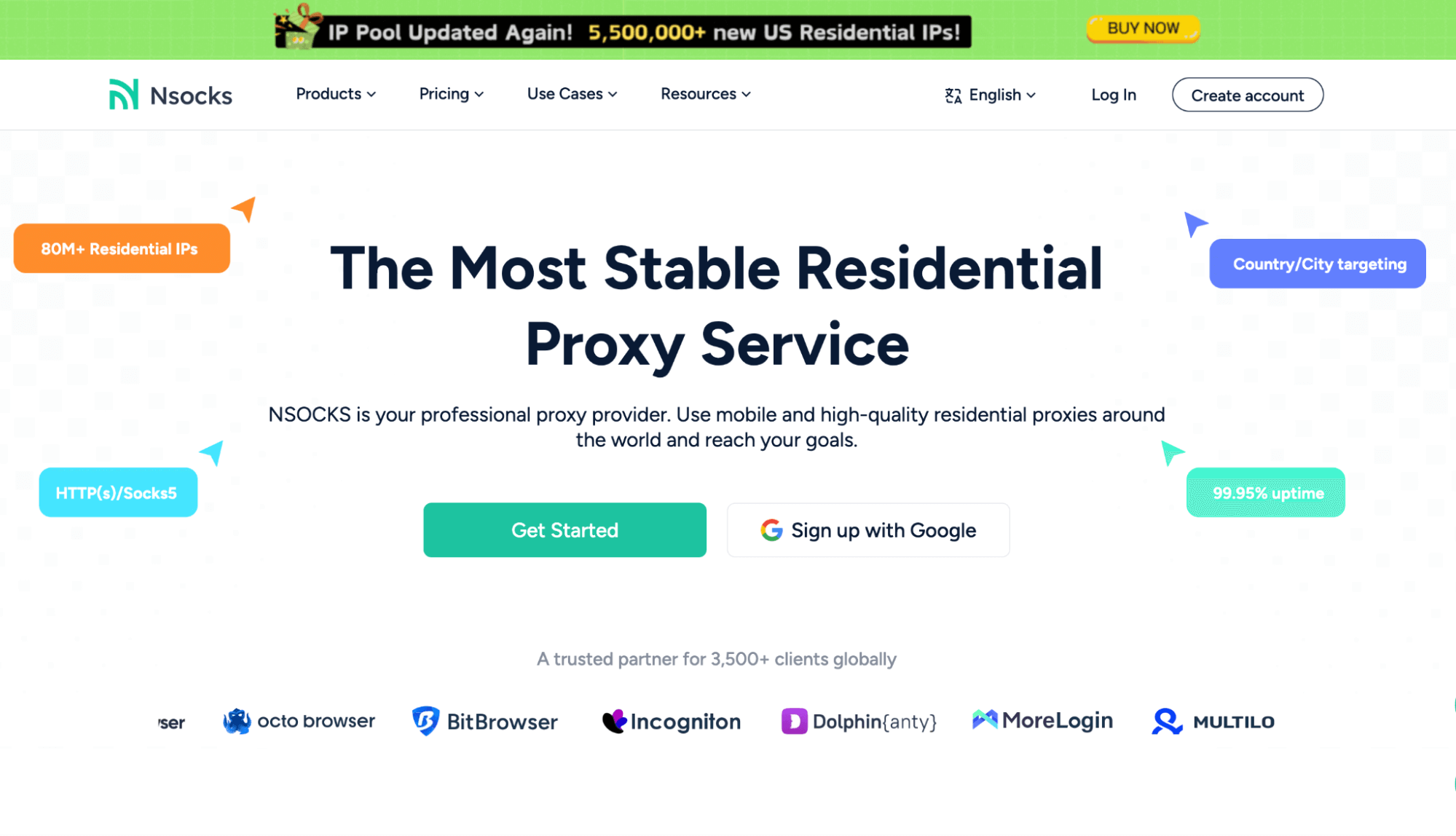
| Why Best for Security Teams & Attack-Surface Monitoring | Use Cases |
|
✔️ Hybrid stack in one panel: residential, ISP, and static datacenter proxies ✔️ Fine country / city / ASN targeting to mimic real-user traffic ✔️ Stable static IPs with long sessions and unlimited bandwidth ✔️ Traffic graphs and error stats tuned for noisy security workloads |
✅ Continuous uptime and health checks for high-risk web assets ✅ Attack-surface mapping, bot / WAF tuning, and rule regression tests ✅ Replaying suspicious sessions from clean lab IPs ✅ Scraping exposed panels, login flows, and catalog data without burning in-house IPs |
Nsocks is one of the few proxy providers that solves the pain points of security engineers (not just web scrapers). Their static datacenter proxies live in the same dashboard as rotating residential and long-acting ISP IPs. That lets you flip between “noisy scanner” and “stealthy user” traffic without touching another vendor account.
The datacenter proxies come as dedicated static IPs with unlimited bandwidth and support for HTTP(S) and SOCKS5. Locations cover the usual suspects in North America, Europe, and key Asian hubs, and you can buy either per-country blocks or mixed regions. In my tests, these IPs behaved predictably under load. I saw no surprise swaps mid-session or random timeouts while long-running scans were in progress.
What I liked most was the visibility. Nsocks’ dashboard exposes per-product traffic charts, success percentages, and error breakdowns. That’s exactly what you want when a new WAF rule suddenly starts throwing 403s. Spin up a few static datacenter IPs, point your tools at them, and you see which rulesets are over-aggressive and which hosts are fine.
The trade-offs are mostly around onboarding. There’s no one-click free tier – either start with a small package or talk to sales about trial credits. Pricing is fair for dedicated IPs, but you have to track how many addresses you lock in and how long you keep them. For teams already juggling threat-intel feeds, scanners, and scrapers, Nsocks is a good way to centralize proxy control.
Performance Testing
Here’s how Nsocks’ static datacenter proxies performed in my 24-hour benchmark (mixed e-commerce and login targets, moderate concurrency, static sessions):

Pricing
Free trial: No, only short test access on request via the sales team.
Online payment methods: Credit cards, Google Pay, Apple Pay, PayPal, Alipay, WeChat Pay, crypto, and some local wallets (like UPI).
| Duration | Price per IP* | Notes | Buy |
| 10 days | $3.50 / IP | Best if you need short-term DC IPs for focused tests or one-off audits. | BUY |
| 30 days | $7.00 / IP | Classic “monthly” setup; lower cost per day than 10-day plans. | BUY |
| 60 days | $11.00 / IP | Long-term option with the best per-day value if you know you’ll keep the same IPs. | BUY |
And Finally…
If you’re not a big enterprise, don’t stress too much if a datacenter proxy provider lacks a ton of advanced technical bells and whistles. Seriously, I recommend you instead pay close attention to the subscription plans and how flexible they are. It’s the thing that really differs when it comes to payment structures and commitment lengths.
Depending on your business scale and the scope of your proxy-related tasks, it’s smart to zero in on those rotating datacenter proxies that align with your specific niche. I certainly don’t advise those one-size-fits-all services that try to cover everyone—from solo developers to massive corporations. Let’s be real; it’s almost impossible for them to deliver the best datacenter proxies that fit everyone’s budget.
The game plan? Lock in your price range first, then dig into key credentials of the tech specs and service plans. That’s how you’ll find the right balance without overspending or compromising on the features you actually need.
Other categories
Do you want to find out the up-to-date information, news, and expert feedback about modern proxy solutions? That all is at your fingertips:



